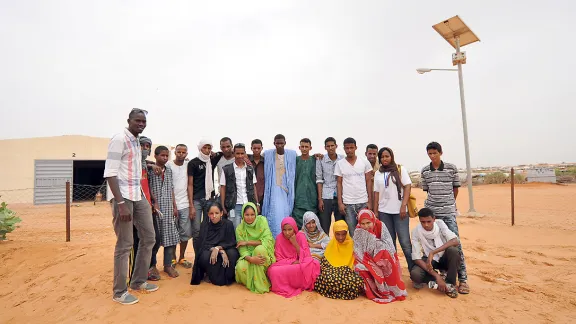
Young people in Mberra camp. They usually meet 3-4 days a week. Photo: LWF/ C. Kästner
MBERRA, Mauritania/ GENEVA, 4 February 2016 (LWI) – “It’s difficult to say how we pass our time in the camp. You wake up and you wonder what to do all day,” Ag Mohamed, 19, says. “There is nothing for us to do here.”
Ag Mohamed is a refugee. He came to Mauritania two years ago, after fleeing the conflict in Northern Mali. In the M’berra refugee camp, 50 kilometers from the Malian border, he finished his high school diploma, or baccalaureat, but he has no possibility to continue his studies and go to university in his present situation. M’berra camp, home to 50,000 refugees, lies in the Sahel region, literally in the desert. The next human settlement, a small town named Bassikounou, is 18 kilometers away. People here live off raising livestock. There is not enough water and grazing grounds for everyone though, and many refugees cannot continue their traditional way of life. The young people in the camp are left with nothing to do.
Training in life skills
Because of this the Lutheran World Federation (LWF), responsible for camp management in M’berra through an agreement with the United National High Commissioner for Refugees (UNHCR), decided to start a livelihoods program targeting the young men and women who spend the formative years of their lives in the uncertainty of a refugee camp. An initial group of 250 now receives training in life skills and community development. In turn each of them will train five other young people.
Their education centers on human rights, child protection and how to participate in community life. Later 250 young people out of the 1,500 youth trained in community building will be selected for vocational training and receive cash grants to set up a business. The goal of the project is to build the community and help them take responsibility in society as much as actually learning a craft. “We prepare them to take on leadership roles after their future return to Mali,” LWF camp manager Demba Niang says.
Give something back
This is the first time that young people are the focus of such a project. “We have lots of trainings of this type in M’berra, but we normally work with elders and traditional leaders. Youth are not represented,” says camp manager Demba. “The idea is to engage the youth in the camp to give something back and to think about the community.”
For some of them this comes quite naturally. Mariam Minte Assalik, 19, the group’s vice-president, is eager to contribute. In a patriarchal society which values experience and age, it is a challenge for a young woman to pursue these dreams. “Culturally, women in our community have no right to work, but we can’t stay without anything to do in the camp” she says.
Mariam has a diploma, but stopped studying because of the war. Then she got married. Now she wants to show her husband that she can contribute to the family income as well. “If a woman is working, she is helping everyone. The entire family will develop, it will impact their surroundings and eventually the community,” Mariam says. Looking at the determined young woman, there is no doubt she will at least try to overcome the perceived double stigma of being young and female.
Keep young men out of trouble
Promoting women’s rights and empowering girls in the camp is one objective of the project. The other is to keep young men out of trouble. Due to the scarce resources, relations between refugees and hosts are strained. When something happens in Bassikounou, the locals are quick to blame the young people of the camp. “By training them and keeping them occupied, we also keep stability,” camp manager Demba says.
His greatest concern is to protect them from recruitment into militia. “Armed groups are a problem in the entire Sahel,” Demba says. “Our young people could become a target.” Although the Mauritanian police and military maintain strict border control and even confiscate hunting weapons from anyone entering the country, Demba knows that the only chance to keep young people from joining armed groups is to give them a choice.
Hope for the future
“In Mali, our dreams were different, but for the moment we are living here,” says Ag Mohamed. The 19-year-old has taken an interest in the rights of children. The human rights workshop has made him aware of abuses, now he wants to advocate for children while in the camp, and pursue his studies when he returns to Mali. Mariam dreams of becoming a nurse in maternity care. Others talk of becoming doctors and lawyers, opening shops and being mechanics.
While many of the young people hope to be selected for vocational training, open a business and earn the money to marry and have a family, for now Ag Mohamed also sees the value of the life skills training that everybody receives. “No matter what we will do after, I want to continue with this group. We have so many ideas, and now we have learned to express them,” he says.
“The future is in our hand. We know that.”
The project is supported equally by the Evangelical Lutheran Church in Wuerttemberg (ELK-WUE) and the ICDP, which is funded by the Church of Sweden, Evangelical Lutheran Church in America and the Finnish Evangelical Lutheran Mission.


